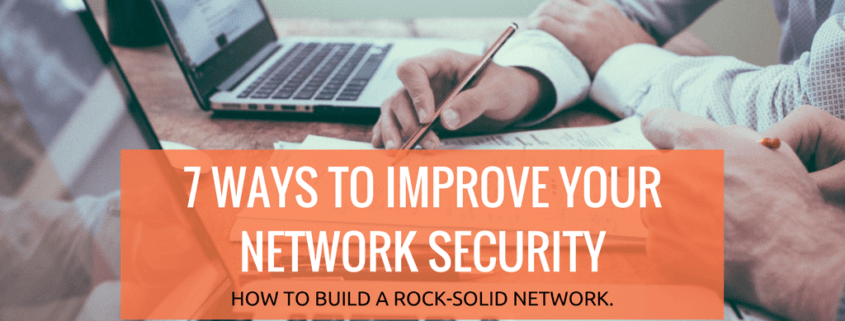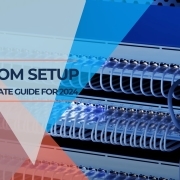7 Key Steps to Protect Your Small Business Network in 2024
Last Updated on March 17, 2024
The Ultimate Small Business Network Security Checklist for 2024
Hey there, fellow business owners! If you think only big corporations get hacked, think again. Small businesses are increasingly juicy targets for cybercriminals – in 2023, 43% of cyberattacks specifically targeted small businesses (source: Verizon Data Breach Report).
I know it can be overwhelming figuring out where to start with cybersecurity. But protecting your business doesn't have to be a nightmare, even if you don't have a huge IT team. This guide will walk you through essential steps to shore up your defenses. Let's dive in!
Table of Contents
1. Firewall and Network Protection
Think of your network as a castle; your firewall is the moat with a picky drawbridge. A good firewall controls what traffic gets in and out, stopping suspicious stuff at the gate. Here's what you need to know:
Firewall Basics
- A firewall is a software or hardware that filters network traffic based on rules you set. It's your first line of defense against unauthorized access.
Next-Generation Firewalls (NGFW)
- These are like your super-powered security guards. NGFWs go beyond basic blocking and can detect intrusions, scan for malware within traffic, and even control which applications are allowed on your network.
Zero-Trust Architecture
- This might sound fancy, but it's simple: “Never trust, always verify.” Don't automatically trust any device or user, even inside your network. Zero-trust limits access to only what's necessary, helping contain damage if a breach occurs.
Key Takeaways:
- Invest in a good firewall for advanced protection, ideally a Next-Generation Firewall (NGFW).
- Learn about the Zero-Trust approach and start thinking about how to implement it, even on a small scale.
- Don't have the tech expertise to do this yourself? Reach out to an IT service provider. A little investment now can save you major headaches down the road!
2. Router Security
Your router is the gateway to your entire network. If hackers can compromise it, they're basically at the front door of your digital castle. Here's how to protect it:
- Secure Your Router: Routers are prime targets for attackers, so making it difficult for them is essential.
- Firmware Updates: These aren't just about new features; they often patch critical security holes. Check your router's settings (every few months!) for updates and install them immediately. Not sure how? Most router manufacturers have instructions on their website.
- Strong Admin Password: Don't stick with the awful default password that came with your router! Hackers have lists of these. Create a strong, unique password (at least 12 characters, a mix of upper/lowercase, numbers, and symbols). A password manager can help you store it securely.
Important Note: Even an awesome password won't help if an attacker exploits a security flaw in old firmware. Updates are essential!
3. User Authentication and Access Control
Think of usernames and passwords as keys to your digital kingdom. You wouldn't hand out copies to everyone, would you? Here's how to manage access securely:
MFA Everywhere
- Multi-factor authentication (MFA) requires more than just a password. It's like needing a key AND your fingerprint to get inside. MFA should be mandatory for ALL sensitive accounts (email, online banking, network logins). Authenticator apps are much more secure than SMS texts for MFA codes.
Principle of Least Privilege
- Give people access only to what they need to do their jobs. Your receptionist probably doesn't need access to sensitive financial data, right? Limit what people can access to reduce the damage a compromised account can cause.
Password Hygiene
- We all know the rules, but people get sloppy! Regularly remind employees of best practices:
- Unique passwords for every single account
- Long, complex passwords – ditch the birthdays and pet names!
- Never reuse passwords between work and personal accounts
- Consider a password manager to help keep track of it all.
Quick Tip: Password-related headaches are a major reason companies outsource IT security. It's surprisingly affordable!
4. Secure Remote Connections
Whether working from home or checking emails at a coffee shop, connecting remotely requires extra care.
The VPN Mandate
- VPN stands for Virtual Private Network. It creates an encrypted tunnel for data, making it unreadable to snoopers on public Wi-Fi. ALL employees working remotely should connect via VPN. Period.
Site-to-Site VPN
- If you have multiple offices or warehouses, consider a site-to-site VPN. It permanently links locations, offering seamless protection for data moving between them.
Mobile Device Management (MDM)
- If employees use phones or tablets for work, MDM software lets you enforce security rules on those devices. These rules can include requiring strong passcodes, remote wiping if a device is lost, and controlling app installs.
Did you know? Many cyberattacks start with someone clicking a bad link on their phone. Protect company data even when employees aren't technically “at work.”
5. Network Segmentation and Monitoring
Imagine your network as a big house. You wouldn't want guests to have access to every bedroom and all the valuables, right? Network segmentation works the same way!
VLANs for Damage Control
- VLANs (Virtual Local Area Networks) let you divide your network into smaller, isolated segments. Think of it like putting up walls within your house. You might put guest Wi-Fi on a separate VLAN from your critical business data. If one VLAN is compromised, the others remain safer.
Intrusion Detection and Prevention Systems (IDS/IPS)
- Think of these like security cameras for your network. An IDS watches for suspicious activity, while an IPS can actively block threats. Small businesses often use affordable, all-in-one solutions that combine firewall, VPN, and IDS/IPS features.
24/7 Monitoring
- Ideally, someone is watching your network for signs of trouble. Don't have the resources? Managed Security Services providers can do this for you or consider open-source monitoring tools with customizable alerts.
Pro Tip: Segmenting your network can also improve performance by keeping less important traffic (like guest internet) from clogging up your work network. Win-win!
6. Beyond the Basics
You've got the essentials in place. Now, let's level up your protection:
- Vulnerability Scanning: Hackers look for weaknesses to exploit. Vulnerability scanners (like OpenVAS or Nmap) can help you find security holes in your systems before the bad guys do. Schedule regular scans and fix any issues that pop up!
- Employee Security Awareness Training: Sadly, employees are often the weakest link in the security chain. They click on phishing emails and pick bad passwords. You get the idea. Training programs (even short online ones!) help them spot threats and learn cyber hygiene. This investment pays for itself tenfold.
- Incident Response Plan: If a breach happens, panic worsens things. Have a written plan everyone knows. It should include:
- Who should I contact immediately (IT provider, law enforcement)?
- How to isolate affected systems
- Steps to preserve evidence (for possible legal action)
Important: Cybersecurity isn't something you fix once and forget. Regularly review your security setup, update systems, and train employees. This builds a culture of vigilance!
7. Data Backup & Disaster Recovery
A cyberattack isn't the only way to lose critical data. Hardware failures, fires, and even simple mistakes happen. Could your business survive losing everything? Here's the basics:
Backup Regularly
- Automated backups (daily or even more frequently for critical data) are necessary. Test your backups to make sure they work!
Offsite Storage
- Backups don't help if they're destroyed along with your computers. Cloud storage or offsite storage of backup drives adds extra protection.
Have a Plan
- What data is most critical to restore? Who needs to be involved in recovery efforts? Documenting this before disaster strikes saves precious time.
Tip: Many businesses find cloud-based backup solutions affordable and less hassle than managing in-house backups.
Conclusion
Phew! That might feel like a lot to absorb, but take it step by step. Even implementing a few of these measures drastically reduces your risk of a cyberattack. And remember, you don't have to do it all yourself!
Need help? That's what we're here for! iFeeltech specializes in affordable network security solutions for small businesses. Contact us for a free consultation, and let's build a custom plan to protect your business.











Nandor, it was good to learn more about improving a small business’s network security. Thanks for mentioning how a firewall can prevent unauthorized port usage in your network. I think that it would be smart to invest in an AAA protocol that can improve your network security further by protecting firewalls and other devices.